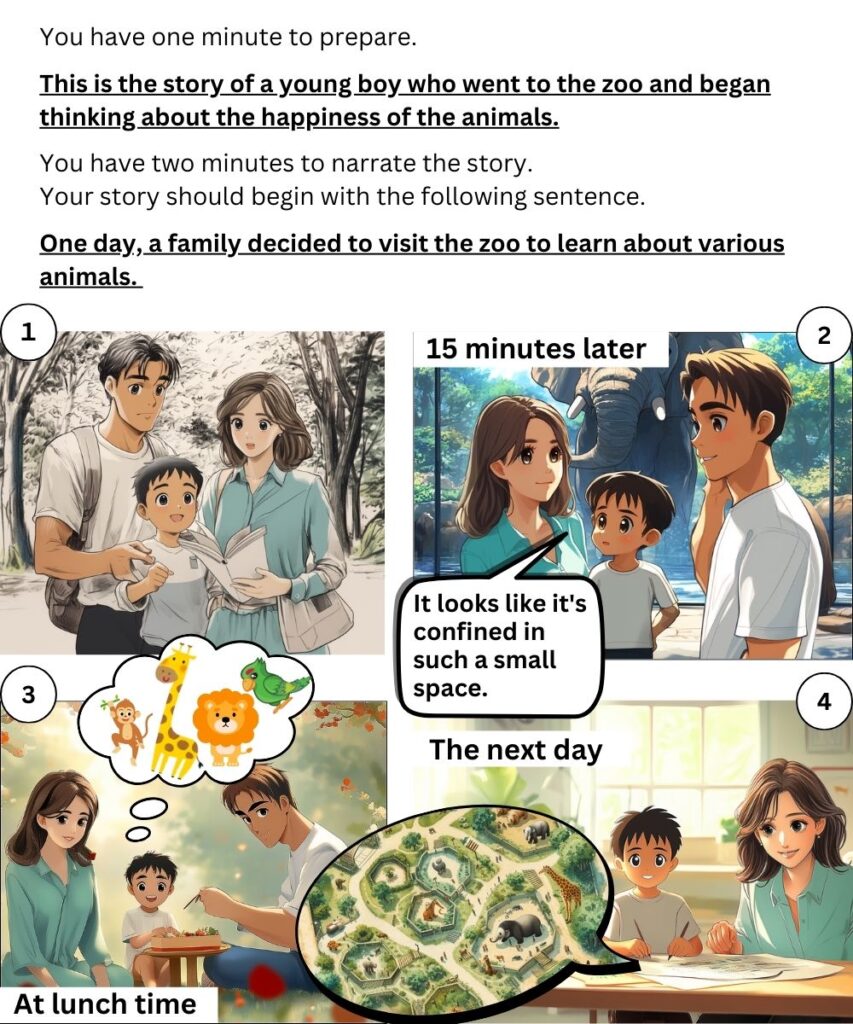実際の出題形式(問題カード)で英検準1級の面接練習を独学できるページです。2024年度にリニューアルされた出題形式をカバーしています。
所要時間:概ね8分
質問概要
ナレーション内容を考える(1分間)
イラストの内容を説明するナレーションを考える
ナレーション(2分間):ナレーションを始める
※2分以上続く場合は、途中でも中止させられるので注意
Q&A(No. 1):イラスト関連の質問
イラストに関連した質問。「問題カード」を見ながら解答できます。
※登場人物が考えている事などを聞かれます。
Q&A(No.2, No. 3)
問題カードに関連した、受験者の意見を問う質問
Q&A(No. 4)
問題カードのトピックに少し関係のある質問。受験者の意見を問う質問
※この<No. 4>質問文に「導入文」が追加されました。
問題カード

ナレーションと質問
ナレーション指示
<指示>Look at the pictures carefully and read the directions silently for one minute.(1分間)
<指示>Now, please begin your narration.(2分間)
Question No.1
Please look at the fourth picture. If you were the woman, what would you be thinking?
Question No.2
Do you believe that zoos are beneficial for children?
Question No. 3
Do you think that fewer people are interested in visiting zoos nowadays?
Question No.4
In recent years, there has been growing awareness of animal welfare and rights. Do you think that children should be taught more about animal rights in schools?
質問音源チャレンジ
本番のように、英語の質問を聞いて答える練習をしてみましょう。
ナレーション準備
ナレーション開始
Question 1 mp3
Question 2 mp3
Question 3 mp3
Question 4 mp3
解答例
ナレーション例
<1> One day, a family visited the zoo to learn about various animals. At the entrance, the boy was happily walking between his mother and father. The mother was holding a map in her hand.
ある日、家族が動物園を訪れ、さまざまな動物について学ぶことにした。動物園の入り口で、父親と母親の真ん中で少年は嬉しそうにしていた。母親は手に地図を持っていた。
意識的に登場人物の気持ちをメンションしよう。今回は 「happily 嬉しそうに」を入れてるよ。
<2> Fifteen minutes later, they arrived at the elephant enclosure. The boy mentioned that the enclosure seemed small for the elephants. Both his parents agreed with him and explained that it is very difficult to create an environment where animals can live happily in captivity.
15分後、彼らはゾウの囲いに到着した。ゾウにとってその囲いは狭そうだと少年は言った。父親と母親はは少年の話に賛成し、動物が幸せに暮らせる環境を人工的に作るのはとても難しいと説明した。
「言った」の言い方にバリエーションを持たせよう。少年の mention に対して、両親が話した内容は explain を使っているね。
いずれも過去形にするのがミソ。
<3> At lunch time, the three of them spread out a picnic blanket in the zoo’s park and ate lunch together. The boy excitedly talked to his parents about the animals he had seen that day and the ones he wanted to see after lunch.
ランチタイムに、3人は動物園の公園にレジャーシートを広げてその上でお弁当を食べていた。少年はその日に見た動物や、ランチの後に見たい動物について楽しそうに両親に話していた。
<4> The next day, the boy, thinking about how animals could live happily in zoos, drew a picture of animals looking content in their environment. His mother watched him draw with a pleased expression on her face.
翌日、少年は、動物が幸せに暮らせる動物園について考えながら、動物が幸せそうに暮らしている絵を描いた。母親はそれを嬉しそうに見ていた。
animals looking content in their environment = 動物が幸せそうに暮らしている
これはとっさに作るのが難しいね。
contentが出てこない時は satisfied with their….でもアリだね。
Question 1 解答例
質問:4枚目の写真を見てください。あなたが女性だったら、何を考えていますか?
I would be thinking about how the zoo visit affected my son and how his concern for the animals’ well-being could be a learning moment. I might also consider discussing with him ways to support animal conservation instead of just visiting zoos.
息子が動物園の訪問によってどのように影響を受けたか、そして動物の福祉に対する彼の関心が学びの機会になるかもしれないと考えます。また、動物園に行くだけでなく、動物保護を支援する方法について彼と話し合うことを考えるかもしれません。
concernって、使えるとカッコええから覚えときや。
I’m concerned about your health.
私はあなたの健康が心配です。
This issue concerns everyone.
この問題は皆に関係しています。
Her main concern is her child’s safety.
彼女の主な心配事は子供の安全です。
He expressed concern about the project’s deadline.
彼はプロジェクトの締め切りについて懸念を示しました。
The environment is a big concern for many people.
環境は多くの人々にとって大きな関心事です。
「concern」は、「心配する」、「関係する」、「懸念」、「関心事」など
Question 2 解答例
動物園は子供にとって有益だと思いますか?
Yes. Zoos provide children with a unique opportunity to see and learn about animals they might not encounter in their everyday lives, helping them develop a deeper understanding of wildlife and conservation.
はい。動物園は、子どもたちに日常生活では出会えない動物を見て学ぶ貴重な機会を提供し、野生動物や保護に対する理解を深めるのに役立ちます。
No. While zoos can be educational, they may also give children the wrong impression about animals living in unnatural and confined environments, which could affect their understanding of wildlife.
いいえ。動物園は教育的な面もありますが、動物が不自然で狭い環境で生活しているという誤った印象を子どもたちに与え、野生動物に対する理解に影響を与える可能性があります。
Question 3 解答例
近頃、動物園に興味のない人が増えていると思いますか?
Yes. With the rise of virtual experiences and increased awareness of animal welfare issues, more people are choosing alternatives to traditional zoos.
はい。バーチャル体験の普及や動物福祉に対する意識の高まりにより、従来の動物園に代わる選択肢を選ぶ人が増えています
No. Zoos continue to attract visitors because they offer a unique opportunity to see and learn about animals up close, which can’t be fully replicated by virtual experiences.
いいえ。動物園は、動物を間近で見て学ぶ独自の機会を提供しており、これはバーチャル体験では完全には再現できないため、依然として訪れる人々を引きつけています
Question 4 解答例
近年、動物福祉や動物の権利に対する意識が高まっています。学校で子どもたちにもっと動物の権利について教えるべきだと思いますか?
Yes. Educating children about animal rights can help them develop a sense of responsibility towards animals and encourage more ethical treatment of animals in society.
はい。子どもたちに動物の権利について教育することで、動物に対する責任感が育まれ、社会においてより倫理的な動物の扱いが促進されるでしょう。
No. While it’s important to teach children to respect animals, focusing too much on animal rights might take away from other essential topics in the curriculum.
いいえ。動物を尊重することを教えるのは大切ですが、動物の権利に重点を置きすぎると、他の重要なカリキュラムから時間が奪われてしまうかもしれません。
面接練習はask本校にお尋ねください:無料体験レッスン予約
こちらの投稿もおススメです:英検2級ライティング 02 教育トピックを100語にまとめる
動物園ジョーク
動物園に関する英語のジョークをいくつか紹介します。
- Why don’t you ever play cards at the zoo?
Because there are too many cheetahs!
どうして動物園でカードゲームをしないの?
だって、チーター(cheater = 詐欺師)が多すぎるからさ! - Why did the lion eat the tightrope walker?
He wanted a well-balanced meal!
ライオンが綱渡り師を食べたのはなぜ?
バランスの取れた食事がしたかったからさ! - What do you get if you cross a kangaroo with a sheep?
A woolly jumper!
カンガルーと羊を掛け合わせたらどうなる?
ウールのジャンパーさ!
Woolly は「ウールの」や「毛むくじゃらの」という意味です。これは羊の毛(ウール)に関連しています。Jumper は、イギリス英語では「セーター」という意味ですが、同時に「ジャンプするもの」という意味もあります。ここではカンガルーがジャンプする動物であることにかけています。
「カンガルー(ジャンプする動物)と羊(ウールの毛を持つ動物)を掛け合わせると、毛むくじゃらのジャンプする動物になる」という言葉遊び。 - Why did the elephant bring a suitcase to the zoo?
Because he wanted to pack his trunk!
どうして象が動物園にスーツケースを持ってきたの?
自分のトランク(鼻)を詰めたかったからさ!
“Trunk” の2つの意味:象の鼻、スーツケースや旅行かばん - Why do pandas like old movies?
Because they’re in black and white!
どうしてパンダは古い映画が好きなの?
白黒だからさ!




